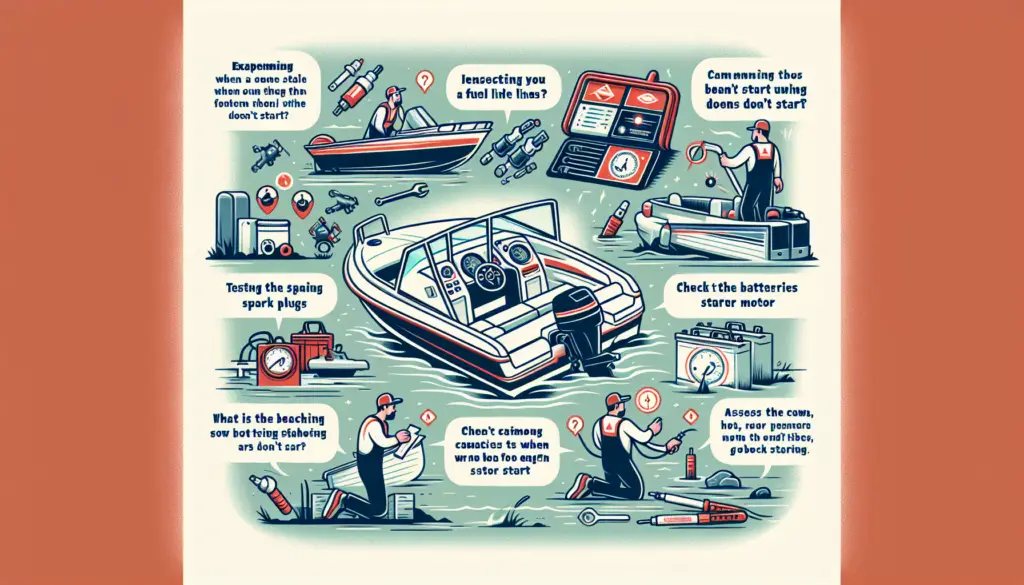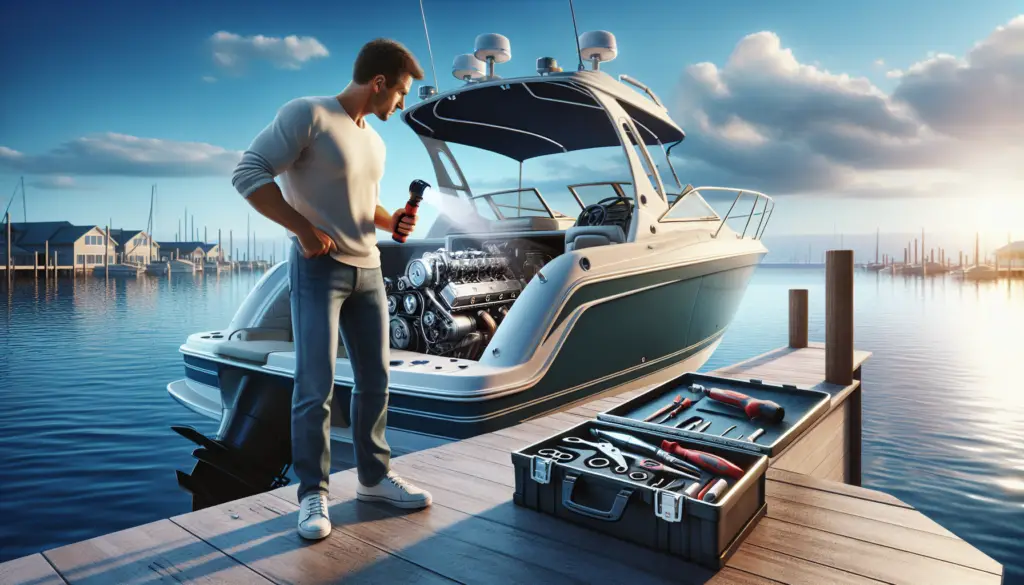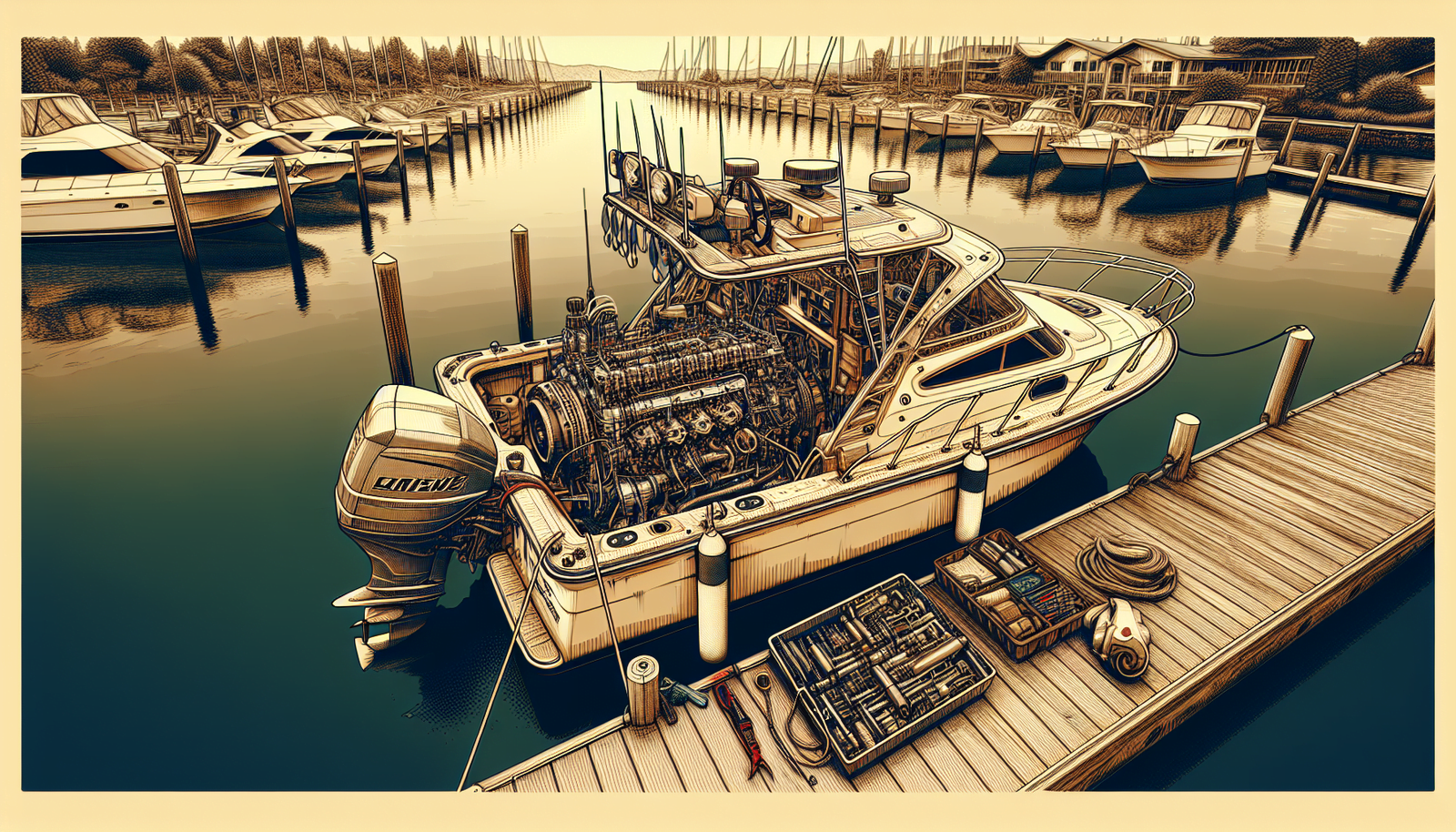Have you ever experienced a day out on the water, only to have it ruined by a boat engine that stubbornly refuses to start? It’s a common scenario that can cause a great deal of frustration. This is especially true when all you want is to enjoy the peaceful waters. If you find yourself in this precarious situation, don’t fret! Within the depths of this article, you will uncover a step-by-step guide to troubleshoot and address this predicament in a way that’s easy to understand and follow. So, whether you’re a seasoned mariner or a casual boating enthusiast, you can confidently tackle the issue when your boat engine just won’t start.

Recognizing Basic Problem Signs
When it comes to sudden engine issues, the first step is identifying unusual behaviors or signs your boat might be showing. This quick recognition can save you time and reduce potential damage.
Strange noises from engine
Listening to your marine engine can reveal a lot about its current health. Strange noises could be anything from grinding, knocking to metallic clattering from the engine. Any unusual sounds you haven’t observed before should be treated as a warning that something might be wrong. They typically indicate potential issues with components such as the piston, crankshaft, or timing chains.
Smoke or unusual smells
Excessive smoke from the boat’s exhaust or any unusual smells can signal possible engine issues. Black smoke might indicate an overly rich fuel mixture, blue smoke often points to oil being burnt in the engine, while white smoke can be due to burning coolant or condensation. Unusual smells like burning rubber or gas can also point to potential problems, including leaks or overheating.
Issue with the throttle
If you notice any lagging or non-responsiveness when you apply the throttle, this should be another warning sign. A functional throttle should respond smoothly and quickly. Potential issues might be related to a dirty or clogged carburetor, issues with the throttle control mechanism, or problems in the fuel system.
Assessing the Battery
More often than not, a boat not starting can be traced back to a battery issue. Routine checks and maintenance can keep you out of such trouble.
Checking battery connections
Start by checking the battery terminals. Are they clean, secure, and free of corrosion? A poor connection can prevent the battery from delivering the necessary power for starting the engine.
Testing battery charge
Next, verify the battery has sufficient charge. A simple multimeter test can provide this information quickly. If the battery is low, it might need recharging. However, be aware that regular recharging without investigating the underlying cause could indicate an aging battery or a problem with the charging system itself.
Alternative power sources
An alternative power source like a jump start pack can be useful when your primary battery is dead. Always keep one handy and know how to use it.
Replacing the battery if necessary
If, even after cleaning terminals and recharging, your battery doesn’t work, it’s time to replace it. Choose a marine battery with the suitable power and design for your boat for optimal performance.

Inspecting the Fuel System
Fuel issues are another common cause of engine start problems. To troubleshoot, you’ll need to fully understand your fuel system.
Checking for adequate fuel
It might seem obvious, but always check your fuel gauge to make sure you’re not out of fuel. After that, visually examine your fuel container to ensure it’s delivering fuel without hiccups.
Verifying fuel flow
Confirm that the fuel is reaching the engine. A faulty fuel line, blocked filter, or malfunctioning fuel pump can disrupt the fuel flow, preventing the engine from starting.
Inspecting for fuel contamination
Over time, it’s common for dirt, water, or other contaminants to find their way into your fuel system. Inspect the fuel in a clear bottle under a bright light for any signs of contamination.
Examining fuel filters
regular maintenance includes checking and replacing fuel filters when necessary. Dirt or other debris can clog these filters, impeding the fuel flow.
Evaluating the Ignition System
The ignition system of a boat is straightforward but vital. If a single component doesn’t work correctly, the engine can fail to start.
Faults with spark plugs
Spark plugs ignite the air-fuel mixture in your boat’s engine. If they’re worn, corroded, or coated in deposits, they may not function properly. Regularly check and replace spark plugs as a part of your maintenance routine.
Problems with ignition switch
A faulty ignition switch can also prevent the engine from starting. If you notice loose wires, corrosion, or any signs of wear and tear, you may need to replace the switch.
Looking at ignition coil and distributor
Both the ignition coil and distributor play key roles in transferring power to the spark plugs. Check these parts for any wear or damage.

Looking into Starter Motor Issues
The starter motor is another crucial component when starting the engine. This electric motor cranks the engine to start the combustion process.
Inefficient motor operation
A starter motor in good condition should be able to turn over the engine smoothly. Difficulties in starting or strange noises during the process might be a sign of a possible failure.
Failures in motor connection
Wear and tears in the motor connection due to prolonged usage can lead to failed starts. Regularly inspect and replace the connectors to ensure optimal operation.
Addressing wear and tea
Just like any other mechanical part, the starter motor can wear out over time. Regular maintenance and timely replacements can prevent start-related issues due to worn-out parts.
Air Intake and Filter Issues
The air intake system provides the needed oxygen for the combustion process in engines. Any issues here can prevent your boat from starting.
Checking air filters
Air filters prevent dust and debris from entering your engine. A blocked or dirty filter can disrupt the air-fuel balance in your engine, potentially causing start failures.
Problems with air-intake manifold
The air-intake manifold can sometimes crack, causing vacuum leaks. Such leaks can lead to a poor fuel mixture and combustion issues.
Inspecting air-fuel mixture
The air-fuel mixture impacts your engine’s efficiency. Too much or too less of either could prevent engine ignition. Regular inspection and adjustment of air-fuel mixture can help avoid this issue.

Attending Cooling System Anomalies
The cooling system helps to regulate engine temperature. Overheating could be a potential reason why your boat isn’t starting.
Monitoring engine temperature
Regular monitoring of the engine temperature helps preempt overheating issues. A constantly high temperature could indicate an issue with the cooling system.
Inspecting cooling fluid
The quantity and quality of the cooling fluid is vital for efficient cooling. Check for any leaks or contamination that could impair the system’s functioning.
Checking coolant circulation
An efficient cooling system circulates coolant properly. Any blockage or failure in the circulation can lead to overheating.
Troubleshooting Electrical Issues
Electrical issues can prevent the boat engine from starting and are generally more challenging to identify and address.
Wiring and connection problems
Loose wires, corrosion, or damaged wiring can cause an incomplete circuit, preventing your boat from starting. Regular inspection and maintenance can prevent such problems.
Circuit Breaker or Fuse issues
A tripped circuit breaker or blown fuse can interrupt power supply to the engine. It’s essential to check these components whenever your boat doesn’t start.
Alternator faults
The alternator, which charges your boat’s battery, might be failing if you’re repeatedly experiencing a dead battery. If this is the case, it might need replacement.
Considering Environmental Factors
Environmental factors often contribute significantly to boat engine issues. Awareness about these factors can better equip you to address them.
Weather conditions
Cold, rainy, or humid weather can sometimes disrupt engine function. For instance, cold weather might lead to battery discharge, thicker oil, or fuel condensation.
Long storage periods
If your boat has been docked for long, problems might arise due to fuel degradation, battery discharge, or component rusting.
Time since last service or engine usage
Regular servicing and usage help maintain engine performance. Extended periods of inactivity could necessitate additional checks before starting the engine again.
When to Seek Professional Help
Despite regular maintenance and troubleshooting, serious issues demanding professional help can arise.
Understanding the limitations of DIY repair
While many minor problems can be handled efficiently by the boat owner, some issues go beyond simple DIY repairs. Identifying these limits is crucial to avoid further damage.
Identifying serious mechanical faults
Complex mechanical issues like internal part failures, severe corrosion damage, serious electrical faults, among others, need professional expertise. If your efforts are unable to resolve the problem or if the problem is too complex to handle, do not hesitate to seek help.
Finding reliable marine repair services
It’s essential to have a trusted marine service provider. Their knowledge and experience can save you time and effort, and assure you that your boat is in good hands. After all, there’s no price for peace of mind out on the high seas.

